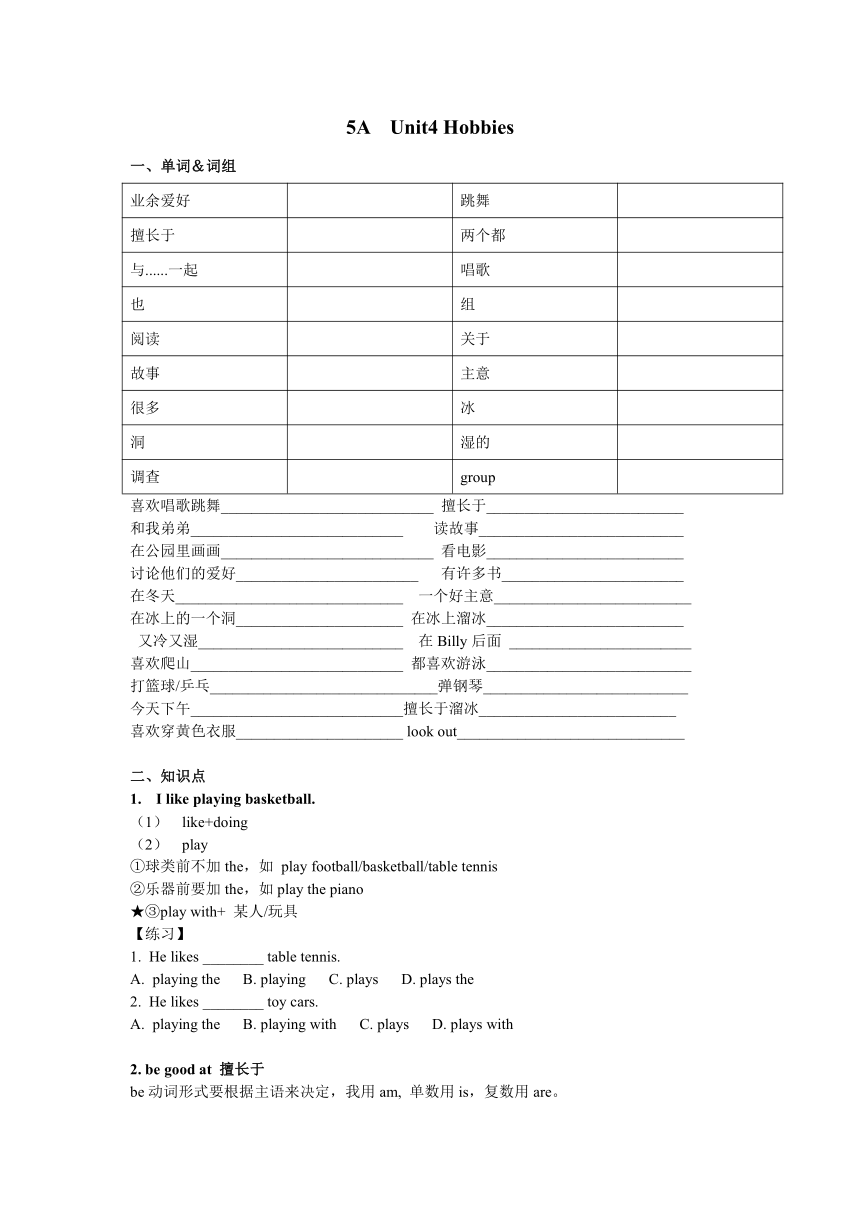
5A Unit4 Hobbies 一、单词&词组 业余爱好 跳舞 擅长于 两个都 与......一起 唱歌 也 组 阅读 关于 故事 主意 很多 冰 洞 湿的 调查 group 喜欢唱歌跳舞_____ 擅长于_____ 和我弟弟_____ 读故事_____ 在公园里画画_____ 看电影_____ 讨论他们的爱好_____ 有许多书_____ 在冬天_____ 一个好主意_____ 在冰上的一个洞_____ 在冰上溜冰_____ 又冷又湿_____ 在Billy后面 _____ 喜欢爬山_____ 都喜欢游泳_____ 打篮球/乒乓_____弹钢琴_____ 今天下午_____擅长于溜冰_____ 喜欢穿黄色衣服_____ look out_____ 知识点 I like playing basketball. like+doing play ①球类前不加the,如 play football/basketball/table tennis ②乐器前要加the,如play the piano ★③play with+ 某人/玩具 【练习】 He likes _____ table tennis. playing the B. playing C. plays D. plays the He likes _____ toy cars. playing the B. playing with C. plays D. plays with 2. be good at 擅长于 be动词形式要根据主语来决定,我用am, 单数用is,复数用are。 be good at用法: (1)+名词 I am good at football. He is good at English. (2)+动词的ing形式 I am good at playing football. He is good at reading English. 【拓展】同义词组:do well in(用法一样) She does well in Maths. They do well in running. 不擅长:be not good at= don't/doesn’t do well in 3. 目前你学过哪些用动词ing的情况? _____ _____ 【例题】 He is good at playing football.(写出同义句) He _____ _____ _____ _____. 2.She is not good at PE.(写出同义句) _____ 将前两句分别转化为肯定句和一般疑问句: _____ _____ _____ _____ 4.目前你学过哪些用动词原形的情况? _____ _____ 5.also,too&either also too either 位置 句中 句尾 句尾 句型 肯定/疑问句 肯定句 否定句 【练习】 他跳舞跳得也好。 He _____ _____ well.=He _____ well _____. 他也跳舞跳得不好。 He _____ _____ well _____. 6.She likes reading stories. read stories读故事 这里“stories”是复数,原形是story 【注】以辅音字母+y结尾的名词,y变ies 如:party-_____; baby- _____; family-_____ 7. She has a lot of books. a lot of , lots of , many, much 都表示“许多”,但用法不一样! a lot of=lots of +_____ 如:a lot of books, a lot of time many +_____ 如:many books much +_____ 如:much water 8. Su Yang likes watching films. watch films=see films watch的用法: (1) v.(动词)观看;注视。 常用词组有:watch TV看电视 watch out小心;提防 (2)n.(名词)手表 复数形式是watches There are two watches in the box. 9.They both like swimming. both 和all 都表示“ 都” ★both 和all 的区别: both =2 如:Mike and Nancy both like swimming. all大于等于3 如:We all like dancing. both/all在句中位置:行为动词前,be动词,助动词,情态动词后 【例题】 1.这些学生都会游泳。_____ 2.他们俩都喜欢画画。 _____ 10.Do you like wearing yellow? wear“穿着,戴着” wear+颜色 如:wear red穿着红色衣服 wear+(颜色)+衣服 如:wear red hat戴着红色帽子 Sam and Billy talk about their hobbies. talk about谈论……(某事) talk with/to sb.与某人谈论 talk about … with/to sb.与某人谈论某事 【练习】 They talk _____ their animal friends. about B. to C. for D. with 12. You’re really good at skating. 文中really adv.(副词) ,“真实地、确实地”的意思 really 作副词也有“真的吗?”的意思,表示怀疑、惊奇、兴趣等 ... ...
~~ 您好,已阅读到文档的结尾了 ~~

